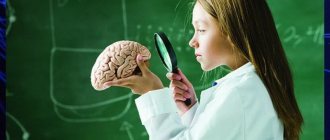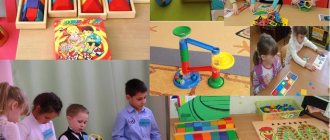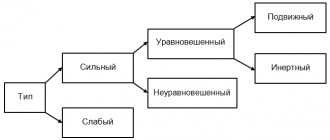Giftedness is a special level of development of personal abilities in psychology. Today, there is constant interest in the issue of giftedness, both in the field of science and in society. And famous people who are considered geniuses are not always truly brilliant from a scientific point of view. Even Alexander the Great, whom the average person would probably consider a genius, was unlikely to be one; he was just a successful student of the true genius Aristotle. And today this is often the result not of personal abilities, but of the help of behind-the-scenes forces - coaches, trainers, PR people, a whole team of professionals. Without it, a person cannot be so exceptionally successful in his business.
Giftedness is a phenomenon known even to children. They were asked what they knew about giftedness, and this is what they answered: “Giftedness is a talent when you are very good at something.” “Giftedness is when a person has a special gift, such as singing.” This understanding corresponds to the everyday concept of giftedness in adults. However, how does science reveal the concept of giftedness?
Giftedness in psychology is a property that allows its owner to achieve extraordinary results in activities. This can apply to one or several areas of life in which a person can be gifted at the same time. A bright, extremely rare talent, when a person differs so significantly from others in his performance results that he makes a breakthrough in an area of interest to him or even in several, is called genius.
Giftedness
The article is based on an interview (07.07.04) with Victoria Solomonovna Yurkevich, head.
sector “Psychology of Gifted Children” of Moscow State University of Psychology and Education, professor, State Prize laureate and simply a talented – gifted person. V.S. Yurkevich has more than one hundred and sixty publications (articles, monographs) in the field of “gifted children.” The concept of “giftedness” is a unique combination of abilities on which the possibility of achieving success in performing one or another activity depends. The peculiarity of the concepts of “giftedness” and “ability” is that the properties of a person are considered in them from the point of view of the requirements that this or that practical activity places on him. Therefore, we can talk about talent for something, for some activity. The concept of “giftedness” becomes meaningless if it is considered as a biological category. The understanding of giftedness depends significantly on the value attached to certain types of activities. Many psychologists have studied the phenomenon of giftedness in children. American psychologist Howard Gardner described the characteristics of manifestations and examples of kinesthetic, spatial, logical-mathematical, musical, linguistic and social giftedness in children. Creativity is a person’s creative potential and is the most important factor in giftedness. American psychologist Paul Torrance explains the concept of creativity as a process that is generated by a person’s strong need to relieve stress that arises in a situation of information deficiency, the search for which includes defining a problem, putting forward hypotheses, etc. “Creativity means digging deeper, looking better, correcting mistakes, talking to a cat, diving into the deep, walking through walls, lighting up the sun, building a castle in the sand, welcoming the future.” Creativity can manifest itself in thinking, communication, certain types of activities and characterize the personality as a whole and (or) its individual abilities. A person's creative capabilities are not directly and directly related to his ability to learn. Many domestic scientists are engaged in research into children's giftedness. Victoria Solomonovna Yurkevich is a well-known scientific researcher in the field of “Gifted Children”. She believes that children’s giftedness is characterized by its degree, quality, originality and other indicators. Tests cannot be used to identify particularly gifted children. The essence of children's special giftedness is a particularly bright and powerful cognitive need. Normal giftedness is when these types of giftedness are included in a number of other needs. Especially gifted children have an extreme cognitive need. Psychologists talk about the so-called “desynchrony”, i.e. uneven development of a particularly gifted child. Mentally and intellectually, such a child is extremely developed, but everything else: social development, understanding of human relationships, family relationships, communication with peers and understanding of their interests - is underdeveloped and sometimes lags behind. In gifted children, as we see, their development occurs according to completely different principles. Gifted children are a risk group, and especially gifted children are a special risk group, since they are not sufficiently adapted to their living environment. High intelligence often does not meet the expectations of the environment, and from this point of view, they, of course, belong to the risk group. Natural prerequisites, genetics, are initially of great importance. At six months, special attention can be observed in especially gifted children; they linger their gaze on new objects for a long time (i.e., innate inclinations already have a difference). All children need to develop their abilities. And especially gifted children, regardless of their inclinations. Here's an example. If a particularly gifted child ends up in a family where there is no developmental environment, then these inclinations will still not turn into abilities. No one can be born gifted, since there are no abilities by nature, but there is something that we call inclinations, which may or may not turn into abilities. For many children, these inclinations have not turned into abilities. The numbers are monstrous. About 70% of children go through life with undeveloped abilities. It follows that abilities must be developed! The role of education in the formation of giftedness is important. It is necessary from childhood to look at what the child’s nature is and educate based on individuality, carefully monitor the development and inclinations of the child. This is the problem of education. Education must clearly focus on the natural uniqueness, the mental uniqueness that a given child represents. And only then follow the path that the child actually chooses to one degree or another himself. Development is the food that we adults will give, we are educators. If abilities have been formed, they cannot disappear, because abilities come from the word “method”. If a person has learned to ride a bicycle, then after many years, these skills are retained. Same with abilities. Another thing is that when they talk about an adult, they mean something else. Abilities and achievements are not commensurate. Most gifted children, at the level at which their abilities have developed, often cannot realize themselves. This situation is due to a number of circumstances. This is a kind of “risk group”. If a person with normal abilities “grows up” - achieves a normal apartment, a car, a good family, but a gifted person cannot do this, cannot realize himself for people, then for him this is a crisis. This pain often leads to mental illness. There is such a concept: a “social crisis” is a failure of one’s life to live up to what it promised. These people are often difficult in interpersonal communication. It's very difficult with them. Many gifted people have a serious state of unfulfillment. Such people are ready to live in poverty for the sake of fulfillment. Usually society is interested in scientific discoveries, and therefore, creative, gifted people. Society rests on two things: continuity and change. But there is a Chinese proverb: “God forbid we live in an era of change,” therefore, on the one hand, society needs bright, talented people, and on the other hand, it restricts the access of geniuses. Some countries suffer from a lack of creative people and are forced to engage in “brain drain” - importing brains. The need to leave oneself in society and history is more inherent in gifted people, like the desire to be immortal. The main obstacle to the realization of giftedness is in gifted children themselves. Inability to manage oneself is a lack of self-regulation. Gifted children do not need to make volitional efforts to do things they don’t like. Such a child will never learn to do what he does not like, i.e. will not force himself, show will, strong-willed skills, but you need to overcome failures, be able to do routine and monotonous work, and bring the job to the end. All these are shortcomings of self-government, shortcomings of communicating with people. The task of the psychologist in this case is very important. Psychologists from Moscow State University of Psychology and Education took part in the interview. Consent Yurkevich V.S. available for publication of interview materials. Giftedness is a special level of development of personal abilities in psychology. Today, there is constant interest in the issue of giftedness, both in the field of science and in society. And famous people who are considered geniuses are not always truly brilliant from a scientific point of view. Even Alexander the Great, whom the average person would probably consider a genius, was unlikely to be one; he was just a successful student of the true genius Aristotle. And today this is often the result not of personal abilities, but of the help of behind-the-scenes forces - coaches, trainers, PR people, a whole team of professionals. Without it, a person cannot be so exceptionally successful in his business.
Giftedness is a phenomenon known even to children. They were asked what they knew about giftedness, and this is what they answered: “Giftedness is a talent when you are very good at something.” “Giftedness is when a person has a special gift, such as singing.” This understanding corresponds to the everyday concept of giftedness in adults. However, how does science reveal the concept of giftedness?
Giftedness in psychology is a property that allows its owner to achieve extraordinary results in activities. This can apply to one or several areas of life in which a person can be gifted at the same time. A bright, extremely rare talent, when a person differs so significantly from others in his performance results that he makes a breakthrough in an area of interest to him or even in several, is called genius.
Tendency to solitude
Gifted people, such as artists and writers, are known to become completely self-absorbed. This happens because a creative person needs to have a certain personal space.
It allows you to slowly think about your plans and analyze what is happening. A person deprived of such a perspective ceases to feel safe. He regains a sense of comfort only after receiving peace and quiet, which allows great masterpieces to be born.
What is giftedness?
We often wonder why one person is considered gifted or even a genius, while another is not? Do you have to become a genius or can you be born one? How do diseases affect genius, and does nature really rest on the children of geniuses?
To what extent does giftedness depend on genes or on environment? According to the study of psychogeneticists using the example of analyzing the development of abilities of monozygotic twins, giftedness depends approximately half on genetics and half on the environment. And in the part that falls on environmental conditions, approximately half comes from the first two years of life, and of the remaining half, the family environment and society give equal parts. Nowadays, more and more attention is paid to intrauterine development. When an embryo grows, it is not so much the genes in their pure form that influence, but rather the interaction between the embryo and the environment; all kinds of stress and diseases can very powerfully affect the child’s abilities.
There is an opinion that “nature rests on the children of geniuses,” that they are much less or not at all talented compared to their parents. If we are dealing with genuine genius, this probably means that the corresponding 200-300 genes have come together in a very successful combination. If such a person has a child, then his genes are half mixed with the genes of his spouse, and such a successful combination will most likely no longer exist, but some of the genes will remain, so the child of a genius will most likely be gifted. But if we talk about the child of a simply gifted person, then the chance that his child will inherit giftedness is quite high.
There are cases where people with mental illness can be gifted in a particular area. This optimistic view is now being greatly reinforced by the media. Unfortunately, according to statistics, we can say the opposite - autism, schizophrenia and epilepsy are often accompanied by low IQ and do not contribute to giftedness. However, there are striking exceptions when a disease transforms the brain in such a way that this transformation benefits giftedness. For example, in epilepsy, there is a focus of increased arousal in the brain, which in severe cases leads to seizures. And if this focus throws its activation into the part of the brain that is responsible for a certain ability, then it may happen that the pathology will work as an extra source of energy for, for example, artistic or mathematical abilities. However, the difficulty here is that an epileptic seizure is akin to rebooting a computer, and after it the process is interrupted, which contributes to a greater extent not to mathematical, but to artistic abilities.
Also, giftedness in the case of illness, of course, is accompanied by successful environmental influences - parents make great efforts to educate and create the proper conditions for a special child.
Love of reading
Today there are few children who enjoy reading fiction. Their books remain unclaimed. But the concept of giftedness in children necessarily implies a love of reading.
For such a child, a book is an opportunity to participate in an exciting adventure, full of amazing discoveries and mysterious secrets. If there is such a sign of giftedness, parents need to do their best to support it in their child.
Signs of giftedness
Children's giftedness - how to identify it? We have already examined the genetic prerequisites for its formation and said that giftedness often coexists with high IQ, which suggests a cause-and-effect sequence between them. Methods for measuring IQ reveal the overall average indicator of the development of various abilities and rather measure adaptability, the ability to quickly navigate new information. There is a joke that IQ tests measure the ability to pass IQ tests, and there is some truth to this.
To identify a child’s giftedness, psychologists focus on the parameters “I want” and “I can,” that is, the presence of motivation for a certain activity, interest and pleasure from it, the manifestation of this motivation in activity, which are already visible results of abilities. Let's take a closer look.
The motivational side of giftedness as “I want” is defined in the fact that the child selectively reacts with great attention to individual stimuli. For example, when listening to the sound of music, he listens, freezes, and is able to listen to the sounds of music for a long time instead of playing games. Or he draws for a long time and in various ways and enjoys the process, and not the praise of adults for a beautiful drawing. This includes inspiration for building construction sets and unusual creative solutions in toy construction; children's enthusiasm for dancing and spontaneous expression of themselves in movement; interest in nature, the desire to observe animals or plants longer, care for and study them. The child is ready not only to be interested, but also wants to strive to bring his passion to the highest result, the peak of perfection, and receives personal satisfaction from this. All these aspirations are investments of energy resources in the chosen area and necessarily have their results associated with the next sign of giftedness - the aspect of activity.
The activity side of giftedness as “I can,” in addition to the fact that it is a continuation of the desire to engage in a certain activity and, as a result of this motivation, logically leads to high results, is also associated with the ability to quickly and successfully assimilate information, find new non-standard solutions, delve deeper into activities and set goals. the goals are more complex.
Giftedness in a certain area is manifested in the master’s own style of action, the personal style of the master, confirming his originality and the creative nature of his abilities, as opposed to simply memorized methods of action. The result of this individual style is a unique product of activity. This aspect also includes a deep understanding of the subject, systematic knowledge about it, the ability to study from any angle and move from simple to complex and vice versa. It is worth saying here that psychologists define giftedness as the ability to create new meanings. This is where the concept of giftedness intersects with creativity and creative thinking.
Desire to know
It doesn’t matter what area a person turns his attention to - music, dancing or reading. The main thing is the desire to do something
Moreover, be sure to devote most of your time to your occupation. The desire to learn becomes a source of courage and enthusiasm, the desire to take risks and implement the most, at first glance, incredible ideas. All this fills the individual with new energy and brings him happiness.
Types of giftedness
Are there separate types of giftedness? They can be distinguished by the degree of expression, form and breadth of manifestations, and types of activity.
As for the degree of expression, if you build human abilities along a certain scale, where zero is the absence of ability, then ordinary abilities follow, then giftedness and the highest values - genius. And the division between the norm and different levels of giftedness is only a continuous gradation, within which one can evaluate certain properties. And only by considering individual properties can we say that it is in the chosen parameter that he is especially gifted, which at the physical level corresponds to the high development of certain areas of the brain, associated, for example, with movements, vision, various types of memory, and logical thinking. When measuring IQ, psychologists consider specific abilities that form the overall indicator. In very rare cases, a person is gifted in all respects at once, such as Leonardo da Vinci, this is a one in a million case. But to be gifted in a specific parameter is, fortunately, a fairly common situation; at least half of people are endowed with individual abilities at the level of giftedness, and the task of each person is to determine his own giftedness and develop it.
According to the form, they distinguish between obvious, noticeable to everyone, and hidden, not yet manifested talent. With the latter, it is easy to make an erroneous conclusion about its absence, but giftedness can manifest itself at an unexpected moment in life, under changed external conditions or due to events in the inner mental life.
Based on the breadth of manifestation, a distinction is made between general and special talent. If the general applies to most types of human activity, then the special concerns only specific areas, the so-called narrow specialization.
Types of giftedness, defined in relation to the types of activities in which it is manifested, are practical, cognitive, communicative, artistic and spiritual.
Definition of the concept
Today in psychology there is no consensus on what constitutes giftedness. This term is most often used in pedagogy. The concept of giftedness here acts as a complex of those qualities that a person possesses. At the same time, their combination allows a person to successfully acquire knowledge and master the skills of educational activities.
In psychology, there are many points of view regarding the essence of the concept of giftedness. However, most often this quality is associated with a person’s attention, cognitive abilities, thinking, memory, creativity and imagination.
That is why the concept of giftedness includes the following individual abilities:
- Observation.
- High degree of concentration.
- Quick and often spontaneous memorization of heterogeneous information.
- Associative thinking, which allows quick access to the data that is stored in human memory.
- Original thinking that allows you to find non-standard solutions to a wide variety of problems.
- Developed imagination.
- Flexibility of thinking, allowing you to operate with categories and concepts from various fields of knowledge.
- High degree of logical thinking.
Thus, the concept of giftedness, arising from inclinations and abilities, provides a person with the opportunity to master various types of activities. But, as stated earlier, it is only a potential resource. To achieve success, a person must also have special abilities.
In psychology, the concept of giftedness is considered as a person’s tendency to be creative, as well as his high overall activity. That is why people who have a high level of this characteristic are able to find a sphere of self-realization for themselves in any situation, as well as a specific area in which they will certainly achieve success. In addition, some psychologists also identify such a concept as “special giftedness.” This quality has a direct connection with special abilities.
What is meant by the concept of giftedness? A person's ability in sports, science, art or other field. They can also be artistic. To achieve success, it is important how a person himself feels about his abilities, whether he believes that these qualities should be developed. Often people do not believe in themselves and in their ability to achieve great heights, they refuse those prospects that they could quite successfully turn into reality.
It is necessary to understand that the beginning of any achievement is the moment an individual accepts his essence. Giftedness is not only a great blessing. It is also a big responsibility.
What is included in the definition of giftedness? Let us consider the components and characteristic features of this quality.
Development of giftedness
Are there any specific genes responsible for giftedness? Despite the search for genes, it is impossible to talk about the presence of one single gene that determines giftedness. We can only consider individual genes, up to one and a half dozen, that provide each ability. For example, according to DNA analysis and a genetic passport, already at the age of one or two years one can see greater endurance due to the special structure of proteins, optimally configured blood vessels and high cardiac output, thereby predicting high abilities for physical achievements. However, this is just a predisposition - whether a person becomes a famous athlete will be further influenced by upbringing and the amount of training. One great violinist, in response to admiring press reviews of his genius, said resentfully: “Since I was five, I’ve been playing the violin every day for 12 hours, and they call me a genius.”
In more subtle areas, for example, artistic, mathematical, pedagogical talent, there are much more of these genes influencing them, the number goes into hundreds. These are genes for a number of hormones that activate brain function, genes that control brain assembly during embryonic development, genes that are responsible for brain function in adulthood - this list is large and has not yet been sufficiently studied. It is not enough to know about genes; it is also important to know how they interact, and creating a mathematical model of genetic endowment is still a long way off. However, even with this genetic passport, parents will need to remember about the child’s own will. A very important factor is the joy of this or that type of activity, which engages the pleasure center in the development of abilities.
Is it possible to develop giftedness with the help of special drugs? Such drugs exist, but they fall into the category of narcotic, psychomotor stimulants. They allow the brain to work much more actively than usual for some time. And with this surge of activation, a person can make significant progress in his abilities. Some great works of art and brilliant breakthroughs in the knowledge of various fields were made under the influence of stimulants. However, such an influence is not harmless - when artificially influenced, nerve cells begin to resist and act in the opposite direction. And to maintain a high level of activation, increasingly large doses of the drug are needed, and at the moment of failure, a sharp rollback occurs. This is how addiction is formed.
The desire for self-expression
Gifted children do their best to demonstrate their own position. From an early age, they defend their point of view and want their opinion to be listened to. It is also important for them to be recognized, since talent certainly strives for self-expression. Such children will never hide from people what they really think, even if they remain misunderstood by others. By the age of 3-5, such a child is a bright individual. And adults cannot impose their opinion or force him to do anything. All this speaks of the little person’s self-sufficiency, which finds expression in stubbornness.
Favourite buisness
Very rarely do children, even as teenagers, think about what they want to do in life. But this does not at all apply to someone who is gifted. Such children already have plans for the future in elementary school. They don’t need adult advice, because it will only lead them astray.
Having a child’s own business is a sure sign of his talent. It is important for adults to pay attention to this and begin to develop the activities of the little person that he likes.
Conclusion
Scientists debate the nature of human potential. Disputes are developing actively. Is potential an innate gift? Does potential development occur during life? Is it worth paying attention to the saying: the manifestation of talent is one percent of natural ability and 99% of sweat? Each point has supporters and opponents.
The biological influence on abilities and their manifestation depends on genetic inheritance. Upbringing and favorable factors reveal inclinations and accelerate development. The potential will appear without teachers and psychologists, but later.
Other scientists are convinced: the psyche and character develop in the process of education. For this reason, inclinations are formed in people. The children of primitive peoples received instruction and then conformed to the educated principles. Mowgli children, under the influence of unfavorable conditions, lose contact with society.
Abilities are formed and developed on the basis of inclinations, hereditary and innate. Potential, knowledge and skills characterize a person as an individual, a subject of activity.
Psychologists and scientists have not come to a single concept within the framework of personality theory, but in every era geniuses and talents are born who gain popularity and achieve success.
Genius
This phenomenon is also associated with the level of human abilities. Nevertheless, it occurs quite rarely in life. On the one hand, giftedness and genius are concepts closely related to each other. On the other hand, the last of them is a phenomenon that goes beyond the upper values of the mental norm. That is why people with such abilities are very rare in life.
Genius, despite being outside the normal range, is not at all a disease or pathology. It’s just that a person’s abilities in this case significantly exceed the standard norm that is accepted in society. They allow geniuses to achieve success in several areas of activity at once. In addition, such people, as a rule, influence the development of human society. And if a talented person differs from a capable person in the level of his capabilities in quantitative terms, then a genius already has qualitative differences. After all, he has the highest level of human capabilities.
A genius can be called someone who:
- has an unusual perception of the environment;
- thinks outside the box;
- has the highest degree of creativity, which manifests itself spontaneously, which allows new original ideas to arise naturally and easily;
- has intuitive thinking that is ahead of rational thinking.
Brilliant people are characterized by such traits as passion and interest, which often turns into obsession. They can achieve success in any field, thanks not only to talent and talent, but also to dedication, perseverance and hard work.
What makes talented people different?
Researchers interact with talented individuals, understanding how they differ from ordinary citizens. Talented individuals experience dissatisfaction with the results of their work, as a result of which they strive for self-improvement, self-education and a change in thinking in order to achieve their goals. Geniuses refuse many offers, concentrating on the desired results.
Pianist G. Neuhaus noted that geniuses and talents are born. Despite this, people create a culture that varies in breadth, democracy and loyalty of manifestations. Favorable conditions allow people with inherent potential to become geniuses, talents, and achieve success. For this reason, social society and the specifics of upbringing determine the possibilities for the manifestation of inherent potential and talent.
There is an opinion that nature rests on the children of talented parents. This opinion is confirmed by experience. Talent is inherited to a small extent. Research has led to the following conclusions: mental skills are closer to biological parents, which is due to the hereditary pattern, and not to adoptive parents. Similarity in potential and inherent inclinations does not appear in every situation, and the similarity decreases as a person grows older, who is faced with a different upbringing scheme, experiences personal events, and undergoes changes based on external factors.
Results are achieved not only on the basis of natural abilities, but also under the influence of motivation, conditions for the manifestation of existing potential. Pensioners get a chance to show their talent, although during their life there were no favorable factors for discovering inclinations. Over time, retirees achieve success they never dreamed of before.
Is it good to be gifted?
Of course, a child’s development cannot be limited only to the family. But not every type of giftedness is related to school and finds conditions for development there. For example, the so-called social (leadership) talent, for obvious reasons, is not always encouraged by teachers and even parents. They simply don't know what to do with such children.
Early manifested talent in the arts (musical, artistic, acting) or in sports probably has no direct relation to school either. Often such a child does not feel very comfortable at school: due to constant employment, he communicates less with classmates, and often misses classes due to concerts or competitions. Such children often have emotional problems due to high competition with other children in their “specialty.”









